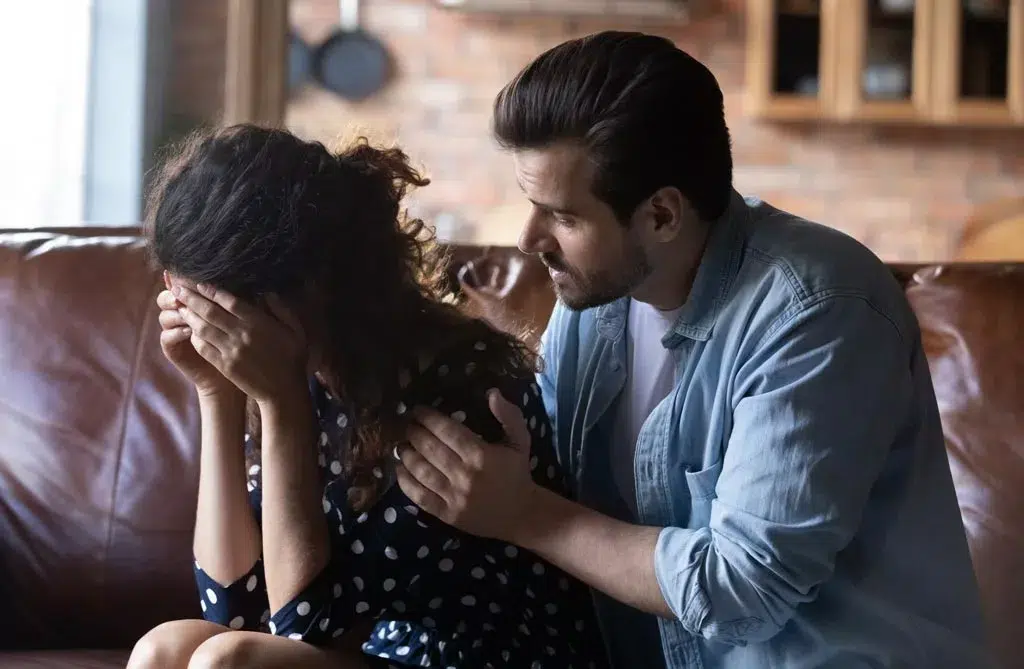What Is Codependency?
Table of Contents
Codependency is a relationship problem or dysfunction that can develop between two people who are intimately involved with one another. Codependency therapy can be an effective way of helping resolve these conflicts, whether in a rehab setting or through outpatient services.
While it is not an official diagnosis in the American Psychiatric Association’s Diagnostic and Statistical Manual of Mental Disorders (DSM-5), the concept has been used by mental health professionals for decades to describe a set of unhealthy behaviors.
Codependents are often caretakers trained to focus their attention on other people’s needs and feelings. They take responsibility for solving other people’s problems and making sure everyone is happy — at the expense of their own needs.
Free Mental Health Assessment
What Are Common Roles in Codependency?
On the other side of that equation, the enabler, commonly known as “the taker,” may become overly dependent on the codependent, even if they’re more capable than they let on. They often feel like they don’t have control over their lives and struggle with self-esteem issues because they don’t know how to make decisions for themselves.
Codependence can also lead to depression and anxiety disorders because codependents often don’t know how to manage their emotions or handle stress well on their own.
It’s important to note that codependency isn’t always negative. Sometimes, it’s healthy for people to depend on each other in close relationships because it makes them feel safe and cared about. But when you rely too much on someone else for your happiness and well-being, it can lead to severe problems later.
The Warning Signs of Codependency
The symptoms of codependency can vary widely, but there are some common signs and symptoms that people with codependency share. If you or someone you know is showing signs of codependency, it might be good to seek help at a treatment center for addiction and mental health. Here are some of the warning signs of codependency:
- An inability to set boundaries: Codependent people, often find it hard to say no or set boundaries with others. They may feel responsible for other people’s feelings, needs, and actions. As a result, they may avoid conflict even when they’re in danger of being mistreated by their partner.
- An extreme need to control others’ behavior: Codependent people often try to influence those around them through guilt or manipulation to prevent abandonment or ensure that others meet their needs. They may also try to control their own behavior by avoiding situations where they might make mistakes or show weakness.
- Difficulty identifying what one wants out of life: Difficulty making decisions about one’s life path based on one’s own values and desires rather than those of another person; feeling as though one doesn’t have any personal goals or interests anymore (other than those of another person).
Codependent relationships are often emotionally abusive because they involve an unequal balance of power. One person has more control over the other person than is healthy for either individual involved in the relationship.
Codependents tend to be highly loyal and dedicated to those they love regardless of how badly they are treated by them. They will go out of their way to make others happy at any cost to themselves, even if it means neglecting their own needs or feelings.
Connections Between Addiction and Codependency
The connection between addiction and codependency can be quite strong. It is essential to understand this connection to help you better understand your role in the relationship. The effects of codependency on those who have an addiction can be devastating because codependents often enable their partners’ behaviors and habits, which only perpetuates their addictions instead of helping them overcome them.
Codependents also often experience feelings of guilt and shame because they feel as if they are responsible for their partners’ behaviors even though they are not directly causing these behaviors themselves.
The truth is that the relationship between an addict and codependent is complex, as both people struggle with addiction and related issues. The addict is likely to be in denial about their condition, while the codependent person may be trying to control the addict or enabling their destructive behavior not to experience rejection.
What Is Codependency Therapy?
There is no single form of therapy that works best for treating codependency. Many different approaches and strategies are used to deal with this complex disorder. Treatments for codependency vary, but most are based on the idea of helping you develop healthier relationships with yourself and others.
Cognitive-behavioral therapy (CBT) is a form of psychotherapy that helps people change the way they think and behave by identifying patterns of thoughts, feelings, and actions and helping them to replace their unhealthy habits with more positive ones. CBT can help people who have been diagnosed with codependency learn how to cope with their emotions without resorting to unhealthy behaviors like addiction or self-sabotage.
Dialectical behavior therapy (DBT) is another form of therapy that is instrumental in treating codependency. DBT focuses on changing how you react to situations by changing your mindset from negative to positive by using mindfulness exercises and problem-solving skills to overcome anxiety and depression.
Family systems therapy can also be employed to help families improve their communication skills so that they can better support one another in healthy ways.
Immediate Placement for Mental Health Treatment
How Can I Find Treatment for Codependency?
If you are looking for help for codependency and addiction, you have many treatment options. You can choose from residential or outpatient programs and inpatient rehab centers that focus on individualized care.
There is no one-size-fits-all approach to treating codependency. The type of treatment that works best depends on several factors, including your needs and preferences. Some people may prefer a residential program, while others may find it more beneficial to attend group therapy sessions or individual counseling sessions on an outpatient basis. Finding the right treatment center for you requires some research into what each facility offers.
Here are some questions to consider when searching for the best treatment centers:
- Do they offer a variety of therapies?
- Do they provide medical detox?
- What kind of structure does their program have?
- What is their success rate?
The internet is a massive resource at your fingertips for researching the various options at your disposal. Keep in mind that a good facility usually has full transparency as to the qualifications of its practitioners and the amenities available within their facility. Also, for the most part, a worthwhile center has a reputation that precedes it. Keeping an eye out for past experiences and reviews from past clients can give you a great deal of insight.
Dual Diagnosis Treatment at A Holistic Rehab
The dual diagnosis treatment at a holistic rehabilitation facility will vary from patient to patient and depends on their specific needs and the severity of their addiction. The first step is to determine if the patient has an addiction or a mental disorder.
If it’s an addiction, they need to be treated for that first before they can begin receiving treatment for their mental health issues. The main goal of dual diagnosis treatment is to break this cycle of addiction and mental illness by addressing both conditions simultaneously.
What Is Holistic Dual Diagnosis Treatment?
Dual diagnosis treatment is a comprehensive, integrated approach to helping individuals who suffer from both mental and substance abuse disorders. This type of treatment integrates treatment for both conditions using various therapies to help people overcome their addiction. This approach is often used in holistic rehabilitation facilities because it addresses the interconnected nature of mental health and substance abuse issues. These types of programs often use a combination of therapeutic approaches that include:
- Medication therapy: Medications are sometimes prescribed to help with symptoms associated with both mental health conditions and substance abuse disorders. Medication therapy can be helpful when used in conjunction with other forms of treatment.
- Counseling and therapy: Counseling sessions can help you learn how to cope with stressful situations without turning to drugs or alcohol for relief and help you understand why you may use substances to self-medicate your emotions or thoughts. Therapy sessions can also help you develop healthy coping mechanisms for stress, anxiety, and depression that don’t involve drug or alcohol use so that you’re less likely to relapse after completing dual diagnosis treatment programs.
- Holistic Treatments: Building life skills like yoga, meditation, and mindfulness, among others, can be found at holistic facilities. Alternative, emerging therapies like art and music therapy can also be found in various facilities.
Cultivating Healthy Connections in Recovery
Recovery involves learning how to form healthy connections with other people and with yourself.
The most important relationship you can have in recovery is with yourself and your own goals. When you’re able to love and care for yourself, you will be able to connect with other people more honestly and with less fear. Recovery is primarily about healing the past, growing into your present, and creating a future that is full of possibilities. It’s about learning to live life on your own terms.
When you have a healthy relationship with yourself, you will be better equipped to communicate with others in ways that honor both parties. You will feel more confident, empowered, and capable of reaching your goals. Here are some tips to help cultivate healthy connections in recovery:
- Learn how to be honest about who you are now.
- Practice being vulnerable by sharing parts of yourself that may be difficult for others to hear.
- Give others room to share their own stories without judging them — even if they seem different from yours.
- Make time for connecting with friends (in person or online) at least once per week.
24 Hour Mental Health Hotline
Find Emotional Sobriety With Residential Care
When someone suffers from an addiction, they need more than just the cessation of substance misuse; they also need an environment that will support their healing process. Residential care provides this supportive environment. It can help those suffering from addiction to get past their current challenges and move toward a healthier lifestyle.
You might think residential care is the same thing as rehab — but there are a few differences between the two: residential programs provide 24/7 supervision for individuals who want help with their addiction but don’t want to go through detox without professional care. Residential programs also offer group counseling sessions led by trained professionals who know how to intervene if someone begins exhibiting signs of relapse or other negative behaviors.
In contrast, outpatient rehab facilities may provide group therapy sessions, but they do not have 24-hour supervision available.
Long Term Recovery from Codependency Is Possible
One of the biggest myths about codependency is that it is a permanent condition. Codependents are often told they’re stuck and that their lives will be forever limited by their own fears, dependency, and neediness. This self-doubt can lead them to believe that they’ll never be able to recover.
However, long-term recovery from codependency is possible, and many people who have struggled with codependency have done so successfully. There are many signs of recovery from codependency that you can look for in yourself or others if you suspect that someone has this disorder.
Seeking Help for Codependency Made Easy
It’s important to note that recovery isn’t always an easy process, and it won’t happen overnight. Recovery from any addiction or mental illness takes time and commitment, but it’s worth it because once you’ve recovered, you’ll have a better quality of life than ever before!
As with any addiction or addictive behavior, the first step will always be seeking professional help. If you suspect that you or a loved one may be exhibiting signs of codependency and would like to talk to one of our compassionate, discrete, and qualified professionals, don’t hesitate to contact us! Emerald Isle Health and Recovery is here to help.



